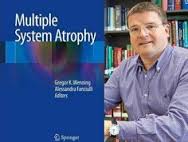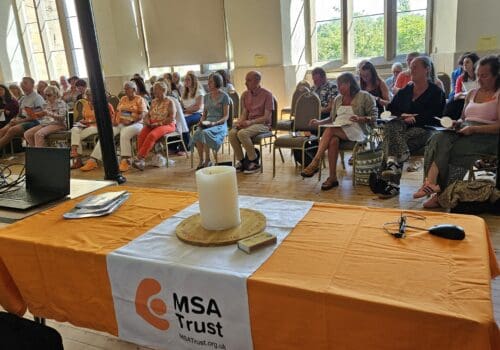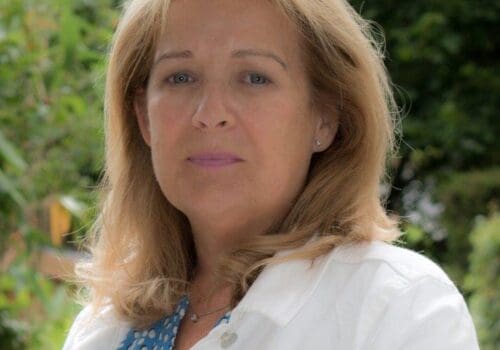Scientific research – a personal story
John Telford, a member of the Trust’s Scientific Advisory Panel, writes about his personal link to MSA.
I lost my wife to MSA five years ago. Always an outgoing, compassionate person, she was very keen to donate her brain – she actually donated it to the Parkinson’s UK Tissue bank but could just as easily have donated it to the one at Queen Square in London.
Very recently a research paper on MSA came out which is being seen as a very important one. Lo and behold, when I looked down at one of its tables of data I saw that the (anonymous) entry for one of the mere fourteen patients whose post-mortem tissues were used, showed a number of characteristics which persuaded me that the entry was for her! I don’t know what your reaction to this is but I got a lift out of it. For me this meant that my wife had made a real and significant contribution towards giving hope to people suffering now and in the future from this devastating disease. Her selfless donation went, in my mind, from being the insignificant contents of a dusty jar on an obscure laboratory shelf to a vital element that enabled an important new discovery to be made.
MSA is a comparatively rare disease which means, obviously, that comparatively few people get it. This means that researchers are hard pressed to find enough people for studies and clinical trials. Clearly the donation of post-mortem neural tissue plays a vital role as my experience above exemplifies. But those who are still very much ‘in the pink’ have a huge part to play too.
So here is where you come in. Seven centres where MSA research is going on in the UK are linking together as an MSA Network. This Network is taking on a major project going under the name of the PROSPECT Study which hopes to provide the underpinning for a number of innovative and wide-ranging research activities. Much of this underpinning will be in the form of information because research needs data in order to achieve discoveries and insights. In this case the source information has to come from those who actually have MSA – you!
Some of this data will be just that: facts and figures and also images from brain scans about how MSA has affected each person at a particular point in time. Other data will be in the form of actual biological samples from patients: blood samples, DNA and sometimes spinal fluid. Conceivably they could even take tiny amounts of nerve tissue but this, of course, would not be from the brain or spinal cord of living people.
People often wish to make an effective contribution to research when they find they have a condition like MSA. PROSPECT will provide a coordinated mechanism to enable this and you could right now sign up to be part of it. You can contact Dr John Woodside who is coordinating the project at prospect@ucl.ac.ukor by phoning 020 7679 4272 and read more about it in June edition of MSA News.
The initial centres are London, Oxford, Cambridge, Manchester, Brighton, Newport and Newcastle but arrangements are being made for patients to participate from wherever they live in the UK.
One part of the study – called the PROSPECT Cross-sectional study – will only involve taking a one-off blood sample from a patient at their GP’s surgery, together, with the completion of a questionnaire at home. For those living nearer one of the centres, the opportunity for longer term participation is greater. This is the so-called PROSPECT Longitudinal Study because it includes follow-up over perhaps several years. It also includes taking a wider range of samples.
You can see why this project will be invaluable. There will be an unprecedented volume of hard information about how MSA affects people which should yield new insights. This can help spot biological characteristics – termed biomarkers – that can make diagnosis much more certain and accurate. At the time she died, my wife was still officially diagnosed as having Parkinson’s!
The Longitudinal Study will also allow details of the usual progress of the condition to be plotted much more accurately. This means that if, as it is hoped, new drugs are found to treat MSA, there will be new, quicker and more accurate ways of measuring whether they are actually effective in slowing or stopping the disease.
Of course the other advantage of having this bank of data and samples is that other researchers can begin to use it. As new discoveries, insights and ideas emerge, those very same samples can provide answers to new sets of questions that had not occurred to anyone to ask before. The gift that keeps on giving!
What’s more, you can declare that you want to keep up your interest and participation stating that you are happy to be contacted by researchers running new MSA studies and clinical trials. PROSPECT will therefore act as a register of patients who wish to keep on helping to achieve better treatments and a cure for MSA by participating in research.
The prime movers in the PROSPECT project are Professors Huw Morris and Henry Houlden, both of whom have been associated with the MSA Trust for a long time. There are many more such researchers around the country who are part of the battle against MSA.
Another person to mention is Professor Gregor Wenning of the Medical University of Innsbruck, Austria. He is on our own Scientific Advisory Panel and, along with other eminent neurologists, has written the definitive book on all aspects of MSA.

Professor Gregor Wenning
Gregor Wenning has been a prime mover in coordinating research into MSA globally through the establishment of the international MSA Study Group. So instead of individual scientists beavering away in isolated laboratories trying to beat each other to the next discovery, picture a community collaborating together and sharing insights so that the elusive cure is brought closer faster.
Through the work of Gregor and others, the Global MSA Registry has now been set up. The PROSPECT Study and its built-in register will be linked to this and so will take its proper place within the world-wide effort. But if you want to you can put your name directly onto this register.
There is plenty of information on this site to explain how it works, what information you will be asked to provide and why this registry is important. It is great to see this concerted, world-wide effort that is specifically designed to make progress!
Things move fast. The MSA book referred to above was published only last year but new research insights have emerged and gained currency since the authors committed their work to press – including the research paper I referred to above that I suspect my wife made an indirect contribution to! These relate to the protein alpha-synuclein and its abnormal behaviour which I wrote about in my last blog. More details on that another time. Unfortunately the importance of this has been somewhat obscured by ‘scare’ stories in the press talking about MSA being a transmissible disease like ‘Mad Cow Disease’ which it clearly is not. Karen Walker’s recent blog debunks and explains this very well.
John
Disclaimer: The views and opinions expressed in the blogs published on these pages are those of the authors and do not necessarily reflect the official policy or position of the MSA Trust.
Recent Posts

MSA Candlelight 2025
19 Jun 2025 | 2 comments

International Nurses Day 2025
12 May 2025 | 1 comment


I’m not sure if people know how to donate to the brain banks, as my Dad was involved in a research project as a living donor (bloods etc) and planned to donate his brain in the event of his death. Almost 3 weeks ago he developed sepsis suddenly and died within 24hrs. Despite our family articulating his wishes to the hospital and providing contact details for the project he was involved in, they had no success in contacting anyone, and it was only several days later any of us were in a fit state to think about who we could… Read more »